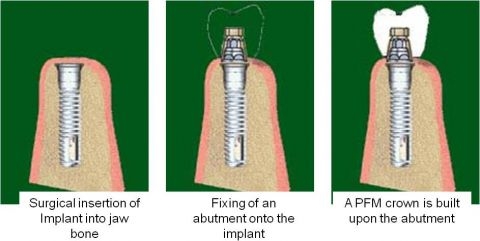Table of content
What are dental implants?
Are you missing a tooth or multiple teeth? Are you not happy with a removable denture due to its inconvenience? Dental Implants are a revolutionary treatment that can be used when replacing damaged or missing teeth. With an implant, you can smile, speak and eat again with comfort and confidence—no more hiding your smile.
The implant procedure: the procedure to fit a dental implant is usually the same whether one or all teeth are missing.
First, the implant (also called replaced root, made with titanium) takes the place of the missing tooth. The implant acts just like a natural tooth root. Usually, the healing process takes 1–6 months to become firmly implanted as a part of the lower jaw.
Next, an abutment is attached to the implant. It supports the new PFM crown.
Finally, the PFM crown is placed on the abutment.
Dental Implant offer the following advantages
- They have been accepted by dental professionals for more than 40 years as a successful and trusted method of tooth replacement in use today.
- They are made of biocompatible materials (titanium)—as a result, they are accepted by your body.
- Your implant can actually last a lifetime with proper care and good oral hygiene.
- Unlike conventional bridges, implants allow one or more teeth to be replaced without affecting neighbouring teeth, and there is no need to grind down adjacent natural teeth.
- Maintain natural bone, and minimise further bone loss due to bone stimulation—one of the most significant advantages.
While dentures can cause bone loss, due to lack of stimulation, the Implant almost completely overcome this problem
Follow Up Care
Dental implants require the same maintenance as real teeth, including flossing, brushing and regular dental check-ups. Periodic follow-up visits will be scheduled to monitor the implants, teeth and gums to make sure they are healthy.








